Mybatis主线流程源码解析
Mybatis的基础使用以及与Spring的相关集成在官方文档都写的非常详细,但无论我们采用xml还是注解方式在使用的过程中经常会出现各种奇怪的问题,需要花费大量的时间解决。
抽空了解一下Mybatis的相关源码还是很有必要。
先来看一个简单的Demo:
- @Test
- public void test() throws IOException {
- String resource = "mybatis-config.xml";
- InputStream inputStream = Resources.getResourceAsStream(resource);
- SqlSessionFactory sqlSessionFactory = new SqlSessionFactoryBuilder().build(inputStream);
- SqlSession session = sqlSessionFactory.openSession();
- MethodInfo info = (MethodInfo) session.selectOne("com.ycdhz.mybatis.dao.MethodInfoMapper.selectById", 1);
- System.out.println(info.toString());
- }
这个是官网中入门的一段代码,我根据自己的情况做了一些参数上的改动。这段代码很容易理解,解析一个xml文件,通过SqlSessionFactoryBuilder构建一个SqlSessionFactory实例。
拿到了SqlSessionFactory我们就可以获取SqlSession。SqlSession 包含了面向数据库执行 SQL 命令所需的所有方法,所以我们可以通过 SqlSession 实例来直接执行已映射的 SQL 语句。
代码很简单的展示了Mybatis到底是什么,有什么作用。
Mybatis主线流程:解析Configuration返回SqlSessionFactory;拿到SqlSession对执行器进行初始化 SimpleExecutor;操作数据库;
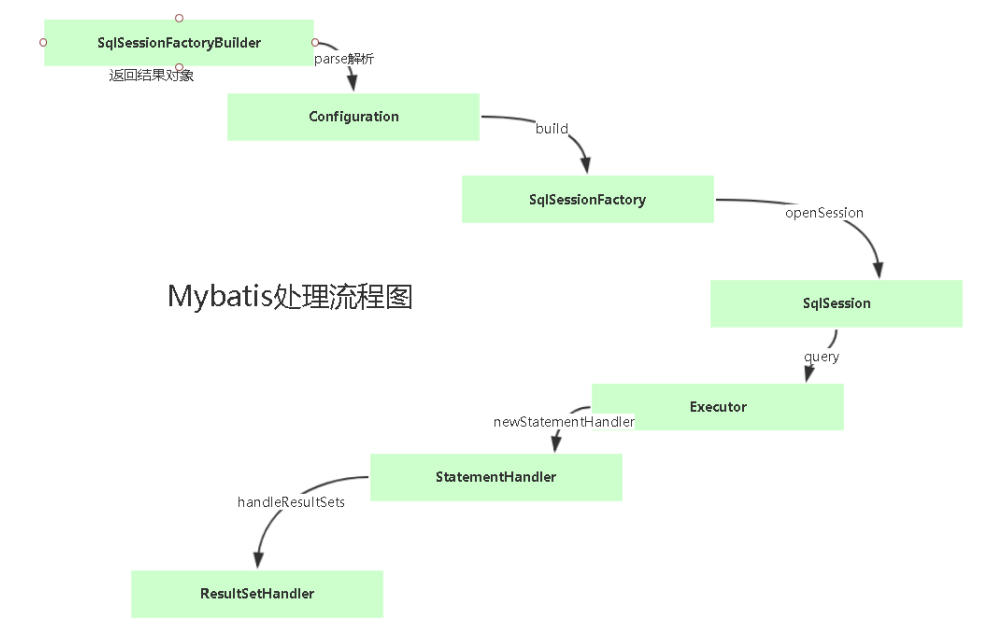
我们先来看一下mybatis-config.xml,在这个xml中包含了Mybatis的核心设置,有获取数据库连接实例的数据源(DataSource)和决定事务作用域和控制方式的事务管理器(TransactionManager)等等。
- <!ELEMENT configuration (properties?, settings?, typeAliases?, typeHandlers?, objectFactory?, objectWrapperFactory?, reflectorFactory?, plugins?, environments?, databaseIdProvider?, mappers?)>
- <?xml version="1.0" encoding="UTF-8" ?>
- <!DOCTYPE configuration
- PUBLIC "-//mybatis.org//DTD Config 3.0//EN"
- "http://mybatis.org/dtd/mybatis-3-config.dtd">
- <configuration>
- <environments default="development">
- <environment id="development">
- <transactionManager type="JDBC"/>
- <dataSource type="POOLED">
- <property name="driver" value="com.mysql.jdbc.Driver"/>
- <property name="url" value="jdbc:mysql://localhost:3306/mytest"/>
- <property name="username" value="root"/>
- <property name="password" value="root"/>
- </dataSource>
- </environment>
- </environments>
- <mappers>
- <mapper resource="mybatis/MethodInfoMapper.xml"/>
- <!--<mapper class="com.ycdhz.mybatis.dao.MethodInfoMapper" />-->
- <!--<package name="com.ycdhz.mybatis.dao" />-->
- </mappers>
- </configuration>
test()前两行主要是通过流来读取配置文件,我们直接从new SqlSessionFactoryBuilder().build(inputStream)这段代码开始:
- public class SqlSessionFactoryBuilder {
- public SqlSessionFactory build(InputStream inputStream) {
- return build(inputStream, null, null);
- }
- public SqlSessionFactory build(InputStream inputStream, String environment, Properties properties) {
- try {
- // SqlSessionFactoryBuilde拿到输入流后,构建了一个XmlConfigBuilder的实例。通过parse()进行解析
- XMLConfigBuilder parser = new XMLConfigBuilder(inputStream, environment, properties);
- return build(parser.parse());
- } catch (Exception e) {
- throw ExceptionFactory.wrapException("Error building SqlSession.", e);
- } finally {
- ErrorContext.instance().reset();
- try {
- inputStream.close();
- } catch (IOException e) {
- // Intentionally ignore. Prefer previous error.
- }
- }
- }
- public SqlSessionFactory build(Configuration config) {
- //XmlConfigBuilder.parse()解析完后将数据传给DefaultSqlSessionFactory
- return new DefaultSqlSessionFactory(config);
- }
- }
- public class XMLConfigBuilder extends BaseBuilder {
- private boolean parsed;
- private XMLConfigBuilder(XPathParser parser, String environment, Properties props) {
- super(new Configuration());
- ErrorContext.instance().resource("SQL Mapper Configuration");
- this.parsed = false;
- }
- public Configuration parse() {
- if (parsed) {
- throw new BuilderException("Each XMLConfigBuilder can only be used once.");
- }
- parsed = true;
//这个方法主要就是解析xml文件了- parseConfiguration(parser.evalNode("/configuration"));
- return configuration;
- }
- private void parseConfiguration(XNode root) {
- try {
- //issue #117 read properties first
- propertiesElement(root.evalNode("properties"));
- Properties settings = settingsAsProperties(root.evalNode("settings"));
- loadCustomVfs(settings);
- typeAliasesElement(root.evalNode("typeAliases"));
- pluginElement(root.evalNode("plugins"));
- objectFactoryElement(root.evalNode("objectFactory"));
- objectWrapperFactoryElement(root.evalNode("objectWrapperFactory"));
- reflectorFactoryElement(root.evalNode("reflectorFactory"));
- settingsElement(settings);
- // read it after objectFactory and objectWrapperFactory issue #631
- environmentsElement(root.evalNode("environments"));
- databaseIdProviderElement(root.evalNode("databaseIdProvider"));
- typeHandlerElement(root.evalNode("typeHandlers"));
- mapperElement(root.evalNode("mappers"));
- } catch (Exception e) {
- throw new BuilderException("Error parsing SQL Mapper Configuration. Cause: " + e, e);
- }
- }
- }
mybatis-config.xml 文件中的mapper属性支持四种配置方式,但是只有package,class这两种发式支持通过注解来配置和映射原生信息(原因在于configuration.addMappers()这个方法)。
- private void mapperElement(XNode parent) throws Exception {
- if (parent != null) {
- for (XNode child : parent.getChildren()) {
- if ("package".equals(child.getName())) {
- String mapperPackage = child.getStringAttribute("name");
- configuration.addMappers(mapperPackage);
- } else {
- String resource = child.getStringAttribute("resource");
- String url = child.getStringAttribute("url");
- String mapperClass = child.getStringAttribute("class");
- if (resource != null && url == null && mapperClass == null) {
- ErrorContext.instance().resource(resource);
- InputStream inputStream = Resources.getResourceAsStream(resource);
- XMLMapperBuilder mapperParser = new XMLMapperBuilder(inputStream, configuration, resource, configuration.getSqlFragments());
- mapperParser.parse();
- } else if (resource == null && url != null && mapperClass == null) {
- ErrorContext.instance().resource(url);
- InputStream inputStream = Resources.getUrlAsStream(url);
- XMLMapperBuilder mapperParser = new XMLMapperBuilder(inputStream, configuration, url, configuration.getSqlFragments());
- mapperParser.parse();
- } else if (resource == null && url == null && mapperClass != null) {
- Class<?> mapperInterface = Resources.classForName(mapperClass);
- configuration.addMapper(mapperInterface);
- } else {
- throw new BuilderException("A mapper element may only specify a url, resource or class, but not more than one.");
- }
- }
- }
- }
- }
addMappers()调用了MapperAnnotationBuilder.parse()这样一段代码。我们发现当resource不为空的时候,代码首先会调用loadXmlResource()去Resource文件夹下查找(com/ycdhz/mybatis/dao/MethodInfoMapper.xml),
如果发现当前文件就加载。但实际这个时候type信息来自注解,MethodInfoMapper.xml在容器中被加载两次。所以Configruation下的静态类StrictMap.put()时会抛出一个 Mapped Statements collection already contains value for com.ycdhz.mybatis.dao.MethodInfoMapper.selectById 的异常
- public class MapperAnnotationBuilder {
- public void parse() {
- String resource = type.toString();
- if (!configuration.isResourceLoaded(resource)) {
- loadXmlResource();
- configuration.addLoadedResource(resource);
- assistant.setCurrentNamespace(type.getName());
- parseCache();
- parseCacheRef();
- Method[] methods = type.getMethods();
- for (Method method : methods) {
- try {
- // issue #237
- if (!method.isBridge()) {
- parseStatement(method);
- }
- } catch (IncompleteElementException e) {
- configuration.addIncompleteMethod(new MethodResolver(this, method));
- }
- }
- }
- parsePendingMethods();
- }
- private void loadXmlResource() {
- // Spring may not know the real resource name so we check a flag
- // to prevent loading again a resource twice
- // this flag is set at XMLMapperBuilder#bindMapperForNamespace
- if (!configuration.isResourceLoaded("namespace:" + type.getName())) {
- String xmlResource = type.getName().replace('.', '/') + ".xml";
- InputStream inputStream = null;
- try {
- inputStream = Resources.getResourceAsStream(type.getClassLoader(), xmlResource);
- } catch (IOException e) {
- // ignore, resource is not required
- }
- if (inputStream != null) {
- XMLMapperBuilder xmlParser = new XMLMapperBuilder(inputStream, assistant.getConfiguration(), xmlResource, configuration.getSqlFragments(), type.getName());
- xmlParser.parse();
- }
- }
- }
- }
这个时候我们已经完成了xml文件的解析过程,拿到了DefaultSqlSessionFactory。下面我们再来看一下sqlSessionFactory.openSession()的过程:
- public class DefaultSqlSessionFactory implements SqlSessionFactory{
- private SqlSession openSessionFromDataSource(ExecutorType execType, TransactionIsolationLevel level, boolean autoCommit) {
- Transaction tx = null;
- try {
- final Environment environment = configuration.getEnvironment();
- final TransactionFactory transactionFactory = getTransactionFactoryFromEnvironment(environment);
- tx = transactionFactory.newTransaction(environment.getDataSource(), level, autoCommit);
- final Executor executor = configuration.newExecutor(tx, execType);
- return new DefaultSqlSession(configuration, executor, autoCommit);
- } catch (Exception e) {
- closeTransaction(tx); // may have fetched a connection so lets call close()
- throw ExceptionFactory.wrapException("Error opening session. Cause: " + e, e);
- } finally {
- ErrorContext.instance().reset();
- }
- }
- }
- public class Configuration {
- protected boolean cacheEnabled = true;
- protected ExecutorType defaultExecutorType = ExecutorType.SIMPLE;
- protected final InterceptorChain interceptorChain = new InterceptorChain();
- public Executor newExecutor(Transaction transaction, ExecutorType executorType) {
- executorType = executorType == null ? defaultExecutorType : executorType;
- executorType = executorType == null ? ExecutorType.SIMPLE : executorType;
- Executor executor;
- if (ExecutorType.BATCH == executorType) {
- executor = new BatchExecutor(this, transaction);
- } else if (ExecutorType.REUSE == executorType) {
- executor = new ReuseExecutor(this, transaction);
- } else {
- executor = new SimpleExecutor(this, transaction);
- }
- if (cacheEnabled) {
- executor = new CachingExecutor(executor);
- }
- executor = (Executor) interceptorChain.pluginAll(executor);
- return executor;
- }
- }
openSession()方法会调用DefaultSqlSessionFactory.openSessionFromDataSource()方法,在这个方法中会开启事务、创建了执行器Executor:
MyBatis的事务管理分为两种形式(配置mybatis-config.xml文件的transactionManager属性):
1)使用JDBC的事务管理机制:即利用java.sql.Connection对象完成对事务的提交(commit())、回滚(rollback())、关闭(close())等
2)使用MANAGED的事务管理机制:这种机制MyBatis自身不会去实现事务管理,而是让程序的容器如(JBOSS,Weblogic)来实现对事务的管理
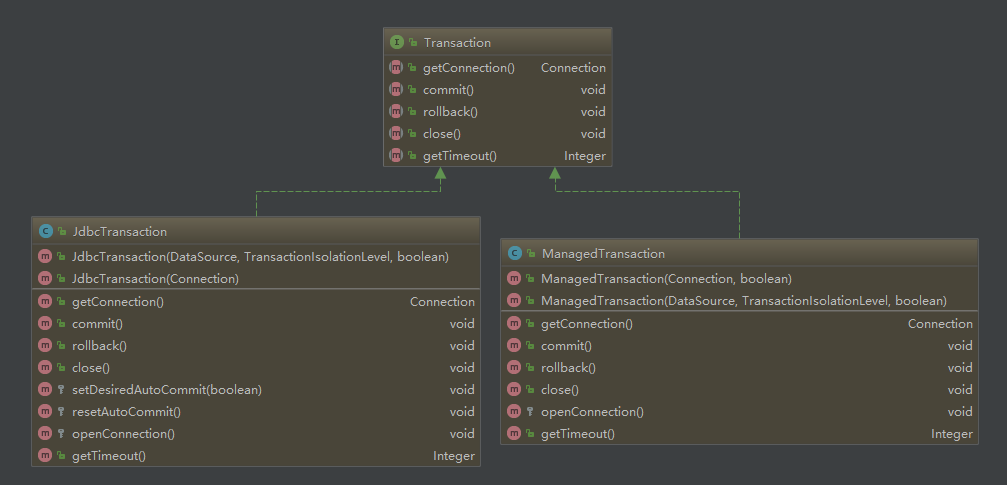
执行器ExecutorType分为三类(默认使用的是ExecutorType.SIMPLE):
1)ExecutorType.SIMPLE: 这个执行器类型不做特殊的事情。它为每个语句的执行创建一个新的预处理语句。
2)ExecutorType.REUSE: 这个执行器类型会复用预处理语句。
3)ExecutorType.BATCH: 这个执行器会批量执行所有更新语句,如果 SELECT 在它们中间执行还会标定它们是 必须的,来保证一个简单并易于理解的行为。
因为Mybatis的一级缓存是默认开启的,查看newExecutor()不难发现,最后通过CachingExecutor对SimpleExecutor进行了装饰(详细代码可以查看https://www.cnblogs.com/jiangyaxiong1990/p/9236764.html)
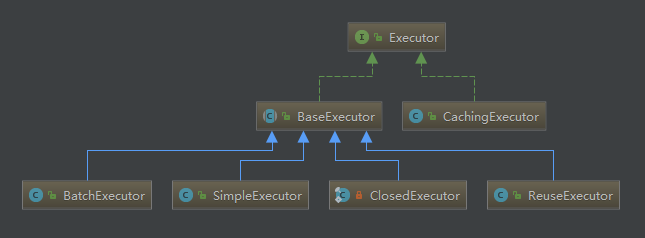
Mybatis缓存设计成两级结构,分为一级缓存、二级缓存:(参考 https://blog.csdn.net/luanlouis/article/details/41280959 )
1)一级缓存是Session会话级别的缓存,位于表示一次数据库会话的SqlSession对象之中,又被称之为本地缓存。默认情况下自动开启,用户没有定制它的权利(不过这也不是绝对的,可以通过开发插件对它进行修改);
实际上MyBatis的一级缓存是使用PerpetualCache来维护的,PerpetualCache实现原理其实很简单,其内部就是通过一个简单的HashMap<k,v> 来实现的,没有其他的任何限制。
2)二级缓存是Application应用级别的缓存,它的是生命周期很长,跟Application的声明周期一样,也就是说它的作用范围是整个Application应用。
MyBatis的二级缓存设计得比较灵活,你可以使用MyBatis自己定义的二级缓存实现;你也可以通过实现org.apache.ibatis.cache.Cache接口自定义缓存;也可以使用第三方内存缓存库,如Redis等
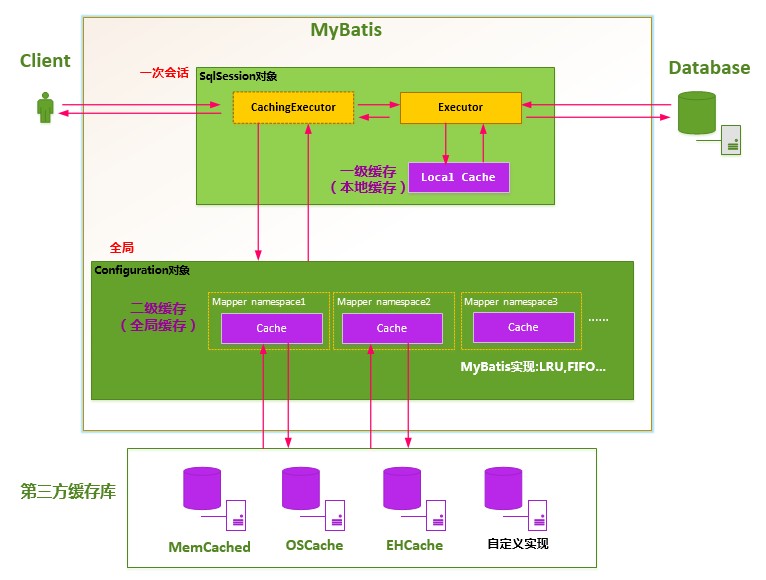
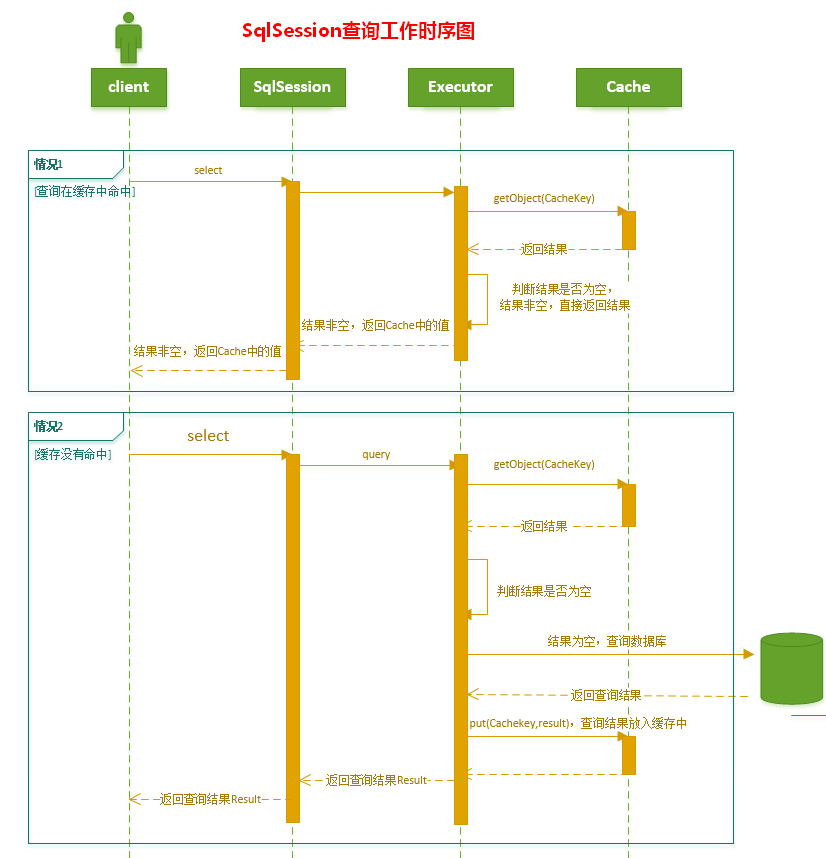
Mybatis主线流程源码解析的更多相关文章
- Spring IOC容器启动流程源码解析(四)——初始化单实例bean阶段
目录 1. 引言 2. 初始化bean的入口 3 尝试从当前容器及其父容器的缓存中获取bean 3.1 获取真正的beanName 3.2 尝试从当前容器的缓存中获取bean 3.3 从父容器中查找b ...
- Hadoop中Yarnrunner里面submit Job以及AM生成 至Job处理过程源码解析
参考 http://blog.csdn.net/caodaoxi/article/details/12970993 Hadoop中Yarnrunner里面submit Job以及AM生成 至Job处理 ...
- Dubbo服务调用过程源码解析④
目录 0.服务的调用 1.发送请求 2.请求编码 3.请求的解码 4.调用具体服务 5.返回调用结果 6.接收调用结果 Dubbo SPI源码解析① Dubbo服务暴露源码解析② Dubbo服务引用源 ...
- Android开发——View绘制过程源码解析(二)
0. 前言 View的绘制流程从ViewRoot的performTraversals开始,经过measure,layout,draw三个流程,之后就可以在屏幕上看到View了.上一篇已经介绍了Vi ...
- Spring bean 创建过程源码解析
在上一篇文件 Spring 中 bean 注册的源码解析 中分析了 Spring 中 bean 的注册过程,就是把配置文件中配置的 bean 的信息加载到内存中,以 BeanDefinition 对象 ...
- Spark作业执行流程源码解析
目录 相关概念 概述 源码解析 作业提交 划分&提交调度阶段 提交任务 执行任务 结果处理 Reference 本文梳理一下Spark作业执行的流程. Spark作业和任务调度系统是其核心,通 ...
- java架构之路-(源码)mybatis执行流程源码解析
这次我们来说说Mybatis的源码,这里只说执行的流程,内部细节太多了,这里只能授之以渔了.还是最近的那段代码,我们来回顾一下. package mybatis; import mybatis.bea ...
- mybatis源码/mybatis执行流程源码解析
https://www.cnblogs.com/cxiaocai/tag/%E9%9D%A2%E8%AF%95%E9%A2%98/public SqlSession session; public S ...
- redis启动过程源码解析
redis整个程序的入口函数在server.c中的main函数,函数调用关系如下图1,调用顺序为从上到下,从左至右. 图1 redis启动函数调用图 main函数源码如下,1-55行根据配置文件和启动 ...
随机推荐
- canvas交互部分
mousemove let mouse = { x: undefined, y: undefined, } // 鼠标监听事件,获取鼠标移动的相应坐标 window.addEventListener( ...
- [翻译] 扩张卷积 (Dilated Convolution)
英文原文: Dilated Convolution 简单来说,扩张卷积只是运用卷积到一个指定间隔的输入.按照这个定义,给定我们的输入是一个2维图片,扩张率 k=1 是通常的卷积,k=2 的意思是每个输 ...
- java笔记--线程的插队行为
对线程的插队行为的理解 在编写多线程时,会遇到让一个线程优先于其他线程运行的情况, 此时除了可以设置其优先级高于其他线程外,更直接的方式是使用Thread类的join()方法 --如果朋友您想转载本文 ...
- Oracle诊断工具 - ORA-4030 Troubleshooting Tool
ORA-4030 说明Oracle服务器进程(server process)无法在操作系统(OS)上分配到足够的内存. 导致ORA-4030 的主要原因有: -物理内存不足 -OS kernel/ ...
- [翻译] iOSSharedViewTransition
iOSSharedViewTransition iOS 7 based transition library for View Controllers having a Common View 基于i ...
- [控件] AngleGradientView
AngleGradientView 效果 说明 1. 用源码产生带环形渐变色的view 2. 可以配合maskView一起使用 (上图中的右下角图片的效果) 源码 https://github.com ...
- [翻译] GCDiscreetNotificationView
GCDiscreetNotificationView GCDiscreetNotificationView is a discreet, non-modal, notification view fo ...
- qt的共享内存
https://blog.csdn.net/gdutlyp/article/details/50468677
- 3种web会话管理方式
一.基于server端的session管理 在早期web应用中,通常使用服务端session来管理用户的会话.快速了解服务端session: 1) 服务端session是用户第一次访问应用时,服务器就 ...
- 【洛谷】【lca+结论】P3398 仓鼠找sugar
[题目描述:] 小仓鼠的和他的基(mei)友(zi)sugar住在地下洞穴中,每个节点的编号为1~n.地下洞穴是一个树形结构.这一天小仓鼠打算从从他的卧室(a)到餐厅(b),而他的基友同时要从他的卧室 ...
